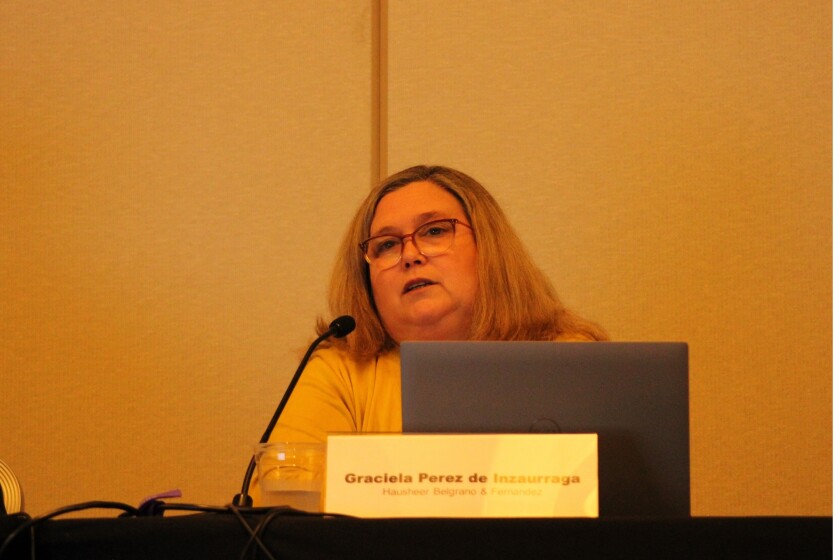Brand owners should think twice before suing creators for using third-party marks without permission, according to speakers at the 2022 AIPPI World Congress yesterday, September 11, in San Francisco.
Counsel from firms in the US, France and China argued that there were several cases that justified filmmakers' and creators' use of third-party trademarks in their works in a session called ‘Films, Games and Books: Use of Third-Party Trademarks’.
Dale Nelson, partner at Donaldson Callif Perez in California, noted that the Court of Appeals for the Ninth Circuit and some other courts applied the Rogers test to determine whether the unauthorised use of brands in artistic works was justified.
The test, established in Rogers v Grimaldi, sets out that creators can use marks as long as there’s some artistic relevance to their use and they’re not explicitly misleading consumers over the source.
Creators have a lot of liberty to use third-party brands under the test, she noted, adding that this freedom was emphasised in the Ninth Circuit’s analysis of E.S.S. Entm't 2000 v Rock Star Videos.
The defendant in that case had portrayed a fictional strip club in its videogame Grand Theft Auto San Andreas under the brand ‘Pig Pen’, which was based on the plaintiff’s real-life ‘Play Pen’ strip club.
The appellate court determined that the use of the mark was not explicitly misleading and was artistically relevant. The court also set out that the artistic relevance simply had to be above nothing.
Not all courts have adopted the Rogers test, however, noted Nelson.
The Court of Appeals for the Tenth Circuit stated in its analysis of Stouffer v National Geographic that it wasn’t bound by Rogers. It instead incorporated a test that was similar to the Ninth Circuit’s, but one that required parties to look more into the motive of the expressive work creator.
The court still ruled in favour of the creator, however.
EU and China
This issue hadn’t been litigated as much in Europe, said Stefan Naumann, partner at Hughes Hubbard & Reed in Paris.
EU trademark law stated that the use of a mark for purpose of artistic expression should be considered fair, he noted, as long as it was in accordance with honest practices in industrial and commercial matters.
Naumann said some had argued that this regulation could be confusing to creators, who may not have understood what constituted honest practices under the law.
But a court erred on the side of free expression in at least one case.
Ferrari sued Take Two Interactive, which owns Grand Theft Auto developer Rockstar Games, for copyright and design infringement and unfair and parasitic competition after the game maker portrayed cars similar to the automaker’s.
The Paris Court of Appeal ruled that similarities between the emblem, name and typeface of the cars didn’t constitute unfair competition or infringement.
The French Supreme Court in 2014 affirmed the non-infringement determination, but stated that the lower court should have analysed the emblem, name and typeface together instead of separately. It remanded the case back to the Court of Appeal.
The court then ruled in 2016 that the defendant’s use of these elements was the result of a creative and parody approach and didn’t support an unfair or parasitic competition claim.
Brand owners in China also shouldn’t presume that they will win cases against creators just because they don’t like the way artists use their marks, said panellists.
Allen Wang, partner at Beijing TA Law Firm in China, highlighted a case that considered the TV drama Grow Up portraying the death of a character’s young daughter after she accidentally swallowed ‘Want Want Jelly’ jellies.
The court held that there was no reputational infringement. It stated that there was no defamation as long as the plot appropriately reflected the inherent characteristics of the product and didn’t depart from the public’s general perception of the real item.
The show didn’t give the audience the impression that Want Want Jelly was more dangerous than other brands of jelly, according to the court.
Catching consent
Creators could consider getting brand owners’ consent to use marks, noted panellists.
Companies might even be willing to provide free products or other benefits in exchange for the use of their marks. But businesses that reach such agreements should ensure they’re in line with regulatory requirements.
Naumann at Hughes Hubbard & Reed noted that the EU prohibited product placement in children’s and religious programmes and in news affairs.
Companies should stay aware of these requirements and of those of other jurisdictions, said speakers.
Graciela Claudia Pérez de Inzaurraga, lawyer at Hausheer Belgrano & Fernandez in Argentian, moderated the panel.
AIPPI is taking place this week at the Marriott Marquis in San Francisco.











